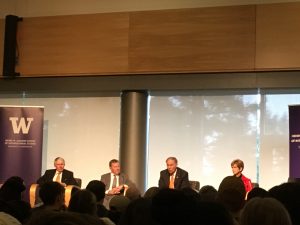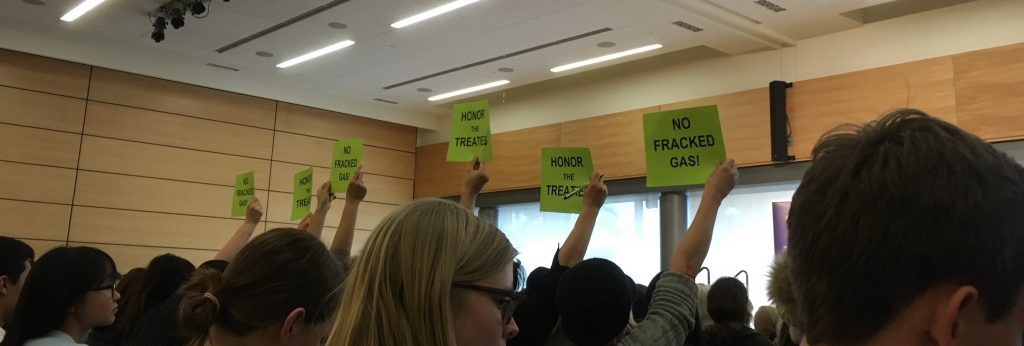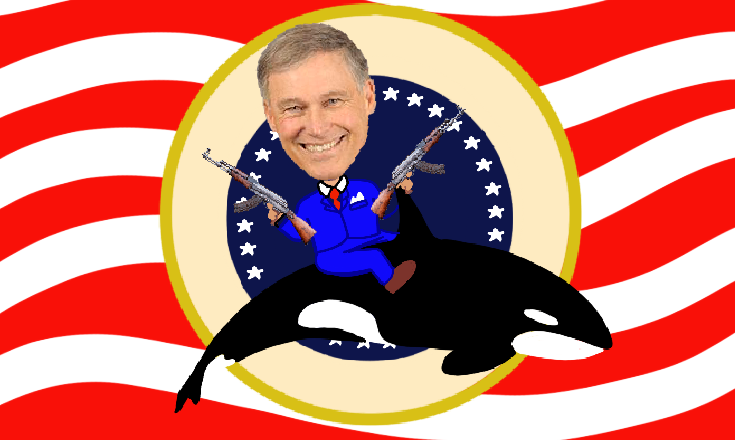On Wednesday, March 6, Washington State Governor Jay Inslee and several members of the American Security Project (ASP) non-profit participated in a panel on climate change and its effects on national security.
Inslee, who recently announced his 2020 presidential run, has long been an advocate of clean energy, and while the talk was intended to be nonpartisan it was directly in line with his proposed presidential focus of stopping climate change. While many of his bills haven’t passed the state legislature, he’s currently pushing a proposal to take Washington entirely off of fossil fuel-generated electricity by 2045 and claims that his pushes towards wind energy in the state have created a six billion dollar industry.
Alongside Inslee, the panelists included Brigadier General Stephen A. Cheney, United States Marine Corps (Ret), Admiral William Fallon, United States Navy (Ret), and Governor Christine Todd Whitman, former governor of New Jersey, former administrator of the Environmental Protection Agency, and current chairperson of the ASP.
The talk, held in the Husky Union Building on the University of Washington campus, was organized by the Henry M. Jackson School of International Studies. Campus police and SPD patrolled inside and outside the building, part of the increased security detail for Inslee due to his presidential aspirations, and on top of security, there were over 500 audience members squeezed into the room.

After opening remarks by UW Provost Dr. Mark Richards and director of the Jackson School Dr. Reşat Kasaba, ASP board member Matthew Bergman described the history and mission of the organization. Founded in 2007 by both Republican and Democrat congress members, the mission of ASP is that “partisan differences stop at the border. When it comes to national safety… and the propagation of democratic ideals, there are no Democrats or Republicans.”
In his initial statement, Inslee spoke of his visit to Paradise, CA in late February — one of the towns hardest-hit by California’s raging wildfires last year. “If terrorists did something that caused Paradise to burn down, imagine the national response,” he said, insisting that “we have a threat causing terrible threats of this nature.” He also cited quotes from a memorandum by the National Security Council on climate change, noting that “our military intelligence experts all agree [that climate change is a national security threat], but we have a person in the White House calling it a Chinese hoax.”
Answering questions posed both by Provost Richards and audience members, the panel discussed climate change and clean energy. Aside from a few remarks about the current president — see above — the talk remained non-partisan, with Inslee refusing to answer any campaign-related questions from audience members or the press.

At several instances during the talk, the prospect of burning natural gas was brought up. Each time the idea was floated, a group of six audience members held up printed signs reading “NO FRACKED GAS” and “HONOR THE TREATIES,” though it is unclear exactly what treaty they were referring to. A similar negative response — though without the signs — was prompted by suggestions of nuclear power. While the signs about the gas made panelists reword their statements several times, Fallon shut the nuclear fears down by wryly saying, “I lived on top of nuclear reactors for years [aboard nuclear-powered Naval vessels] and I’m doing just fine.”
Focusing on the national security aspect of climate change, Cheney and Fallon spoke of the conflicts that arise from insufficient resources and population displacement. “A one-meter rise in sea level,” Cheney stated, “will cause Bangladesh to lose 20% of their land mass and will create twenty to thirty million climate refugees.” Similarly, “Lake Chad has lost 90% of its water, meaning that’s ten to twenty million people with little or no water.” He added that terrorist groups including ISIS and Boko Haram are taking advantage of these people as they migrate in search of resources.
One of the key goals, Inslee insisted, is that no one gets left behind when the switch to clean energy is made. Poor communities “are often the first victims of climate change,” be it through asthma from having to live near freeways or losing their property in natural disasters because they couldn’t afford to insure or move it. Inslee insists that “we don’t have just a transition, we have a just transition to clean energy.”







Be First to Comment